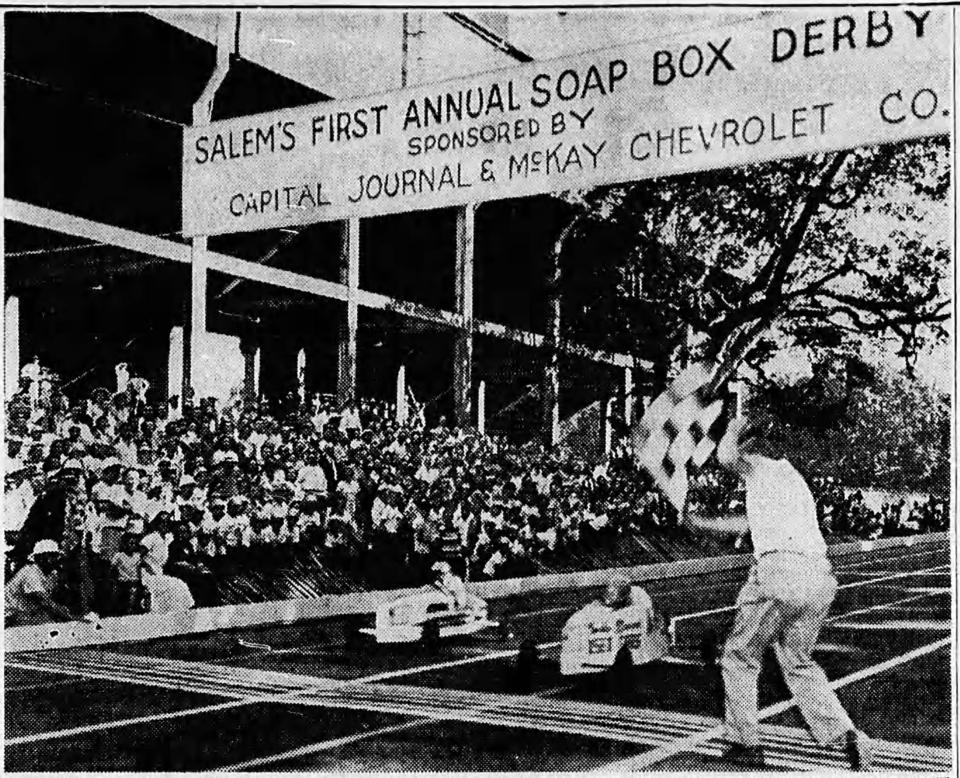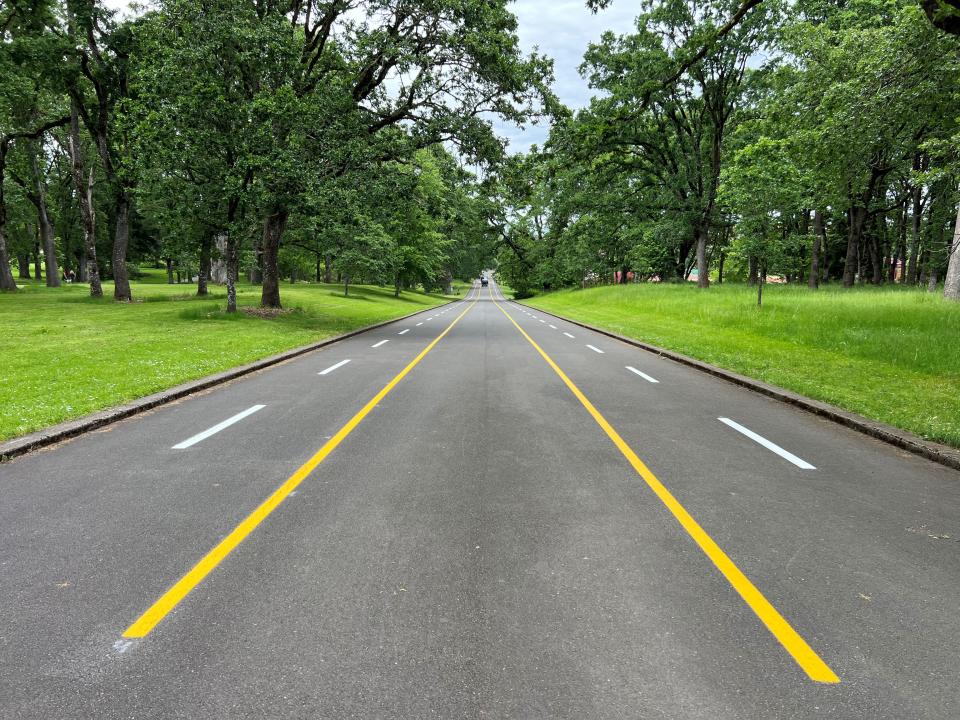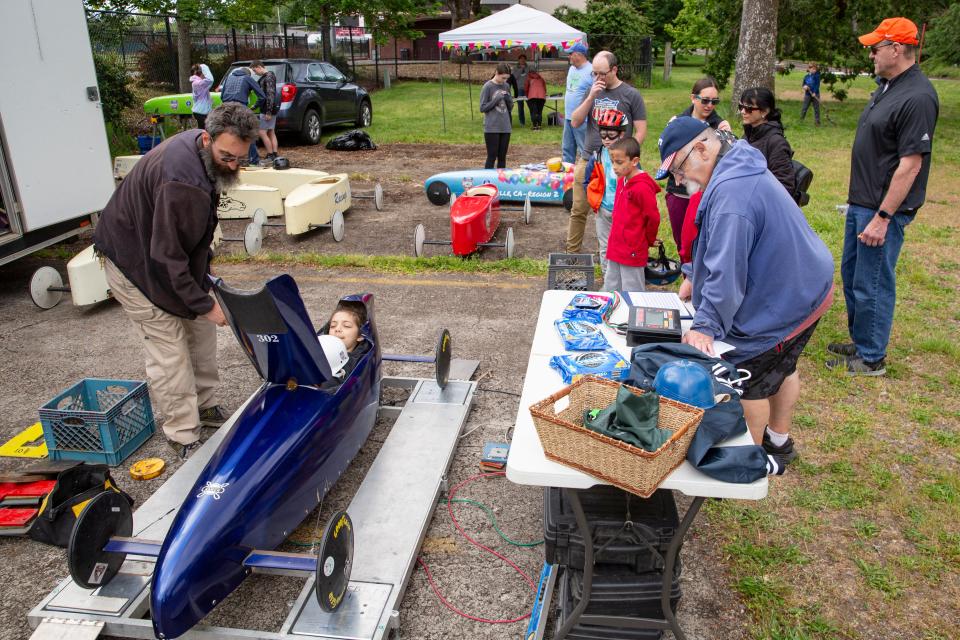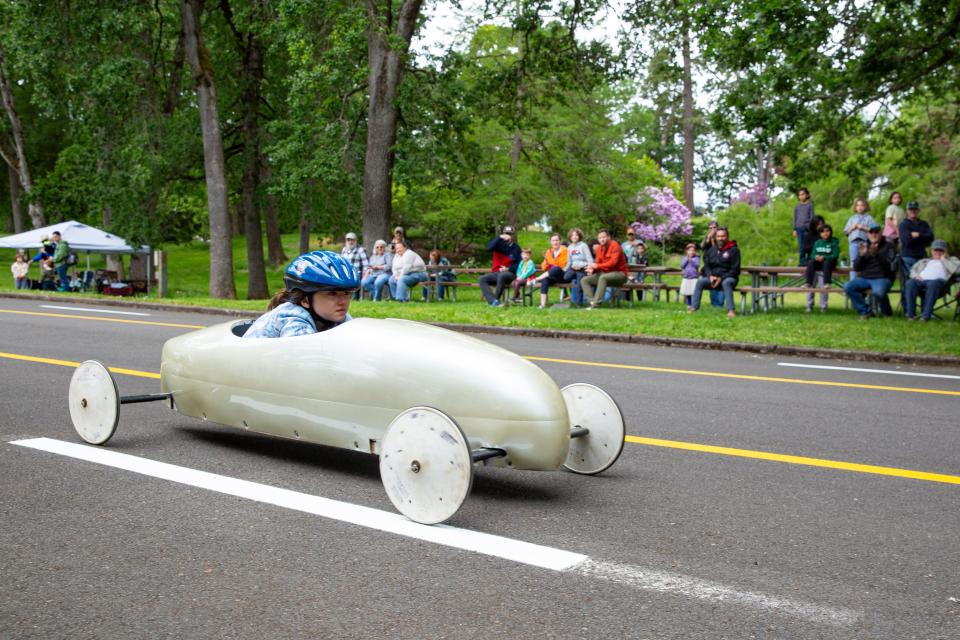Soap Box Derby has been missing from Salem. Why is that?
This is part of an ongoing series answering "Why is that?" questions about Salem and the Mid-Valley.
The question: Why has Soap Box Derby racing been missing from Bush’s Pasture Park? We have some answers. But first, a little history.
The background: Soap Box Derby was introduced in the 1930s as a nationwide sport for boys by Myron Scott, a newspaper photographer in Ohio. As the story goes, Scott was on assignment in the summer of 1933 when he came upon some boys coasting down a hill in their homemade wooden cars.
He persuaded them to round up some friends and meet him in a few days for a race. More than a dozen showed up, one whose car reminded him of a soapbox. Focusing on the bigger picture, Scott organized a series of local races, acquired a copyright, and sought sponsors to establish a national program.
In 1934, he convinced 50 cities across the U.S. to hold races and send a winner to Dayton for a championship race. Chevrolet became the sponsor the following year, and the event eventually was moved to Akron, Ohio.
Salem got involved in Soap Box Derby in the fall of 1951 after a Portland Chevrolet sales promotion manager provided an introduction during a community meeting organized by the local chamber of commerce.
Soon, there were discussions of building a permanent course in Salem, the Capital Journal announced it would sponsor a local race with McKay Chevrolet Company, and a date was set for July 13, 1952.
With four months before race day, the city council unanimously adopted a resolution to “immediately build” a 1,400-foot runway duplicating the championship course in Akron, and the city staff introduced a proposal for Bush's Pasture Park.
City engineer C.A. McClure provided a layout showing the start and finish lines with a 900-foot-long racing course — 530 feet of 6% slope and 370 feet of 2% slope — and a 500-foot-long section for deceleration.
“Our proposed Derby runway in the park is not going to be injurious to the beauty of the park but certainly will enhance what now is nothing but a hole in the ground back of McCulloch Stadium,” McClure said. “When finished, the Derby runway won’t even be visible except when you get right to it, and as we are going to build it, there is no question but what it will add to the worth and interest of the park.”
The city and county offered equipment and staff for construction, and the local carpenter’s and painter’s union pitched in. A company donated $5,000 worth of blacktop. Paving started July 3 and a week later, the lanes were painted white and ready for racing.
Three radio stations broadcast all or part of the event, which drew 150 racers and an estimated crowd of more than 10,000. Spectators packed bleachers at least a dozen deep between the back side of McCulloch Stadium and the track.

The front page of the next day’s Capital Journal included one photograph capturing the checker-flag moment between Keizer brothers Doug and Danny Adams for the championship and another featuring Gov. Douglas McKay with the boys and their parents.
Generations of local boys and girls ages have since participated, building their single-seat, gravity-propelled cars while learning science, technology, engineering, craftsmanship and sportsmanship.
Girls were allowed to participate nationally beginning in 1971, with the first Salem girl racing the following year.
Why has Soap Box Derby faded from Salem?
The city has long been proud of being home to the only dedicated Soap Box Derby track on the West Coast, now with a caveat. It is the only such public track.
Another dedicated track is operated on private property in Camano, Washington, billing its annual event as the largest derby race west of the Mississippi.
The attraction for the Salem track is its similarity to the one at Akron. Racers from California and Washington have traditionally flocked here for events, wanting a test-run before the derby championships in Ohio.

The track was booming in the 1990s and early 2000s, with races often held twice a month in the spring and summer.
Salem became the first city in derby history to produce three consecutive world champions in 1997, 1998 and 1999 — all girls. Then for a long stretch, it could brag about how it had produced more world champions (seven) than anywhere except Akron.
The peak for the local sport could have been in 2010 when Larry the Cable Guy hung out during a racing event while filming a segment for the TV series “Only in America with Larry the Cable Guy.”
Larry, aka Dan Whitney of “Git-R-Done” and Tow Mater fame, was a hit on the hill. He took a few runs down the track, shot the breeze with racers and spectators, and autographed countless cars, helmets and T-shirts.
The sport seemed to fade when long-time volunteers with the nonprofit Salem Soap Box Derby began to step aside as their kids aged out of the sport and moved on to “real cars” and girlfriends and boyfriends. The parents, mostly dads, were burned out and starting to get frustrated with growing expenses and red tape at the city-owned track.
The group started doing business as Oregon Soap Box Derby several years back, hoping to draw more sponsors. It didn’t work.
Races were canceled in 2020 because of the pandemic. Then, the group said its user agreement with the city lapsed.
Speculation swirled on social media in the spring and summer of 2022 when Salem had to scratch a spring event and the local championship race to determine who goes to Akron shifted to the eastern Oregon town of Elgin.
“Due to issues with the city of Salem,” the organization posted on its Facebook page, “we have had to cancel the April 9th and 10th derby race. We have legal staff working on this with us (and are) hoping to have the issues resolved soon. …”
And then this about two months later: “Attention all Derby families: Oregon Soap Box Derby is still dealing with issues with the city of Salem, preventing us from holding our local race at our home track. Fortunately, the city of Elgin in northeast Oregon and the community have been very accommodating ..."
The city of Salem shed no light on the apparent falling out, but the pandemic did create unforeseen challenges to holding in-person events in public spaces with greater scrutiny on policies and procedures to protect the community.
It was a jolt to members of the community who once had a stake in the more than 70-year-old tradition.

Derby officials said most people have no idea how expensive it can be to license a race with the national program and pay for insurance, and that does not include user fees with the city.
Officials already have announced there will be no qualifying race for Akron this year, not even in Elgin, due to lack of funding.
But they say they are on good terms with the city of Salem and now have an agreement through next year to rent the facility for reduced fees in exchange for volunteer hours at the park.
No events have been scheduled for next year yet, but the city is thankful for the organizers' commitment to bringing the Soap Box Derby back to Bush’s Pasture Park. The group's goal is to rebuild the program with help from new Salem-area families. Most of the organization's current board members are not from around here.
Some traveled from across the state May 25-26 to help stage the first derby event on the track since 2021, made possible only because of the sponsorship of an anonymous donor.
Sixty-six youths participated, many from out of the area, racing in lanes recently painted by parks and recreation as part of its routine maintenance of park amenities.

Some of the local old-timers who helped out were thrilled to see the track abuzz again.
If you would like to get involved, email: oregonsbd@outlook.com
Oh, by the way
The man who created the Soap Box Derby is perhaps better known for naming what is known as “America’s sports car.” To learn more, we turn to the National Corvette Museum website:
After Myron Scott organized the Soap Box Derby and Chevrolet became the national sponsor, the company hired him in 1937 as an assistant director for the public relations department. He was responsible for photographing new cars, designing press kits, graphics, and special events.
Scott's induction bio for the Corvette Hall of Fame notes that in 1953, a special executive meeting was called to find a name for the new Chevrolet sports car, then in the developmental stage. The company wanted a name that began with a "C."
None of the 300 names reviewed satisfied the group, so Scott went home and searched the C section of the dictionary, stopping at the definition of "corvette" — a speedy pursuit ship in the British navy. He suggested the name the next day, and the group loved it.
Scott retired from Chevrolet in 1971. Chevrolet sponsored the Soap Box Derby until 1972.
Capi Lynn is a senior reporter for the Statesman Journal. Email your "Why is that" questions to her at clynn@statesmanjournal.com.
This article originally appeared on Salem Statesman Journal: Why has Soap Box Derby been missing from Bush's Pasture Park in Salem


